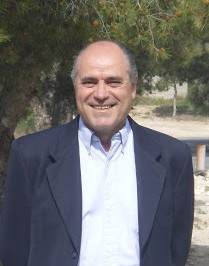Adapted from Victoria Bueno (Diario Información)
Guillermo Bernabéu (1948-2022), Professor of Applied Physics at UA and former vice-chancellor, has passed away
Mutxamelero on all four sides, he was a town councillor in his village and a socialist deputy
 Passionate about astronomy and mutxamelero on all four sides, the Professor of Applied Physics at the University of Alicante, Guillermo Bernabéu Pastor, died on Tuesday, November 22.
Passionate about astronomy and mutxamelero on all four sides, the Professor of Applied Physics at the University of Alicante, Guillermo Bernabéu Pastor, died on Tuesday, November 22.
Born on 10 March 1948, he was a member of IUESAL, Instituto Universitario de Estudios Sociales de América Latina, as an honorary collaborator and researcher and IUFACyT, Instituto Universitario de Física Aplicada a las Ciencias y las Tecnologías. He retired in 2018 and received the institution’s medal at the opening of the 2019 academic year, where he was Vice-rector for Studies and European Convergence and Quality, Secretary General of the University, director of the department of Physics, System Engineering and Signal Theory, and representative of Spain in the Bologna Process Follow-up Group.
Professor Guillermo Bernabéu has played a very important role in the development of professional astronomy in Spain. Due to his discreet and quiet manner, his contributions have often not received the explicit recognition they would have deserved, even within the professional world. Nowadays, with the abundance of means at our disposal -compared to that time- and the incorporation of many young astronomers, it is difficult to value those decisive contributions in their rightful measure. He was the first lecturer to teach the subject of Astrophysics at the University of Valencia, many years before the founding of the Department of Astronomy and Astrophysics at that university. He was a pioneer in space astrophysics in Spain. He wrote one of the first doctoral theses on space astrophysics in our country using data obtained from the International Ultraviolet Explorer (IUE), a space telescope of the European Space Agency. At that time, Guillermo told us, the astronomer physically went to the satellite tracking station in Villafranca del Castillo to carry out the observation in real time, seated in a large armchair surrounded by screens and indicators on all sides, like Star Trek. Moreover, his doctoral thesis in the ultraviolet opened the way to other windows of the electromagnetic spectrum other than the optical one, where our country already had experience and numerous observatories on the ground. It would have been easier and more productive in terms of publications to continue in optical astronomy, but Guillermo preferred to go off the beaten track. He was co-principal investigator of the Low Energy Gamma Ray Imager (LEGRI), which flew aboard MINISAT 01. LEGRI was the precursor of the coded-mask gamma-ray telescopes currently in flight (such as ESA’s INTEGRAL), introducing our country to the then unknown art of large international collaborations. LEGRI is an official part of the history of space astronomy as recorded by NASA’s High Energy Astrophysics Science Archive Research Center (HEASARC). Guillermo led the UA’s contribution to the Spanish and international consortium of the INTEGRAL mission, a class L mission of the European Space Agency, which has been in operation for more than 20 years and which has discovered the first electromagnetic counterpart to the gravitational waves predicted by general relativity and recently detected. LEGRI and INTEGRAL opened the way to X-ray astronomy, which we have been establishing for more than two decades with enormous effort, but also with joy and enthusiasm, at the UA and in Spain. Once everything is up and running and in times of relative abundance, it is easy to forget those who took the first steps, which today seem small, irrelevant perhaps for some, but decisive. And Guillermo, with his quiet passion for Astronomy and the study of the Cosmos and for his friends, was not given to self-promotion and we never heard him claim any of this for himself.
His concern for those around him led him to accept the position as socialist deputy in Congress, which he made compatible with his dedication as town councillor in his village, Mutxamel, and with his dedication as Professor in the Polytechnic School.
Tireless when it comes to working for, with and for others, Bernabéu, when he said goodbye to the town council, highlighted the implementation of new technologies and the strengthening of the area of tourism as the two most important projects he had developed during his management.
His tolerance, calmness and capacity for work, as well as his personal attitude, always above ideologies, have characterised a magnificent person whose loss is mourned by the town where he was born, “his” University, the party with which he developed his most civic concerns and all those who have had the opportunity to deal with him.
We will miss his kindness, the appreciation of his friends and the beautiful memories we have had with Guillem. We will not be able to fill the emptiness that he leaves us but we will have a plethora of happy memories that we have shared while living together with Guillem.
This will ensure that he will still be with us, with these memories.
We will never forget him.
Our deepest condolences to his family.
